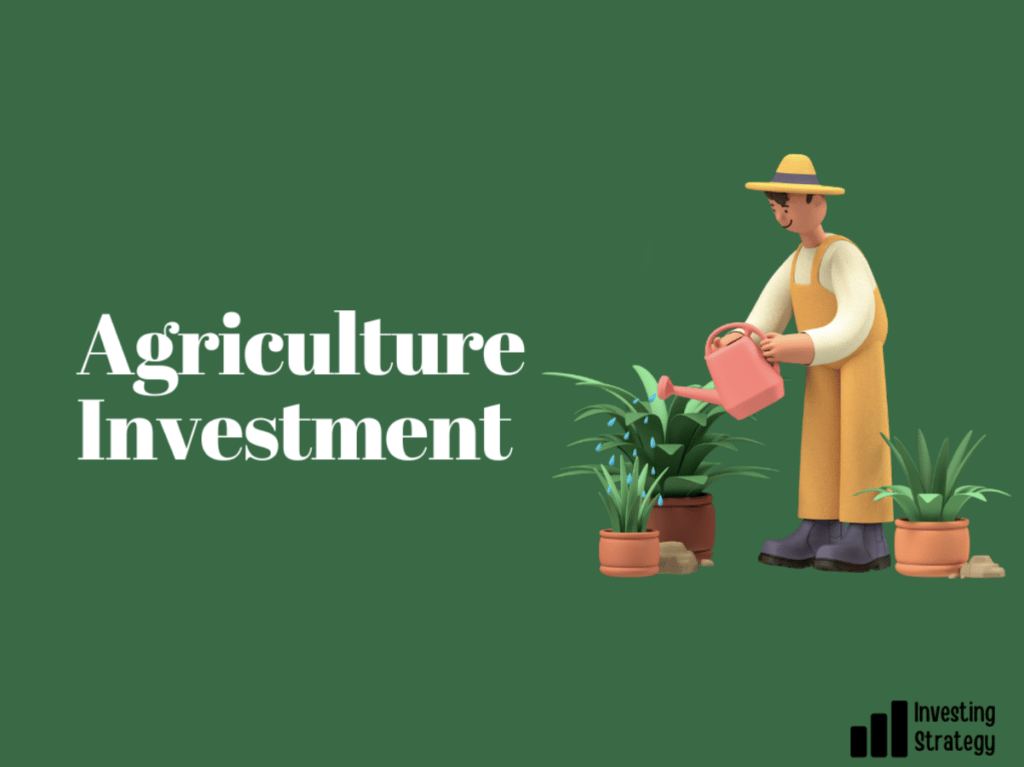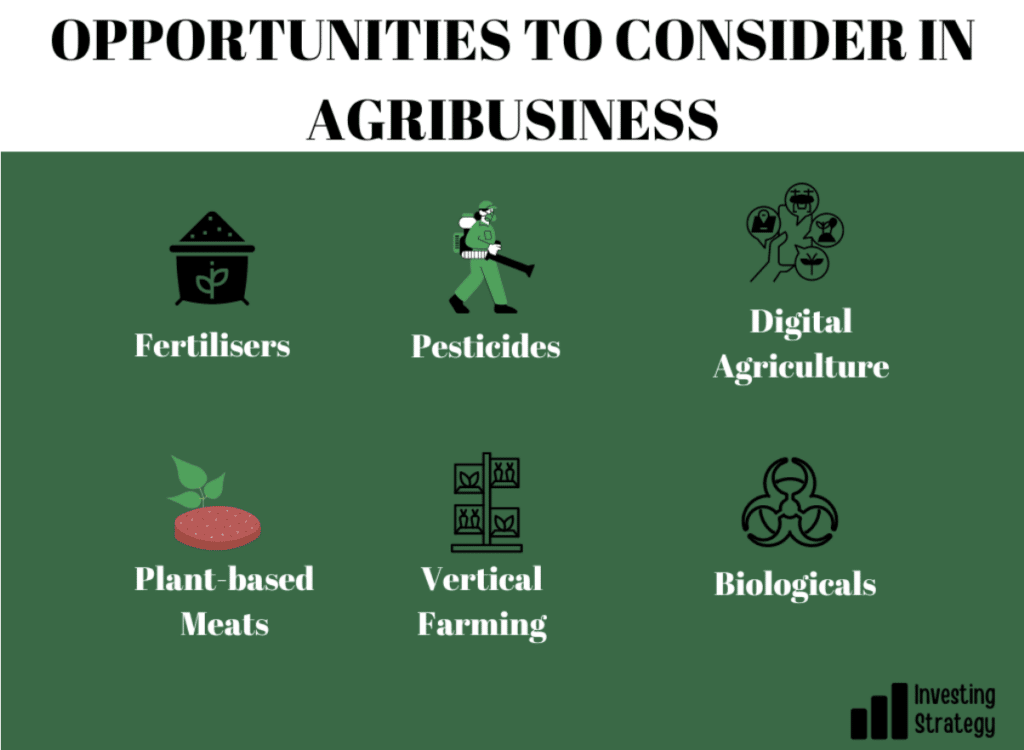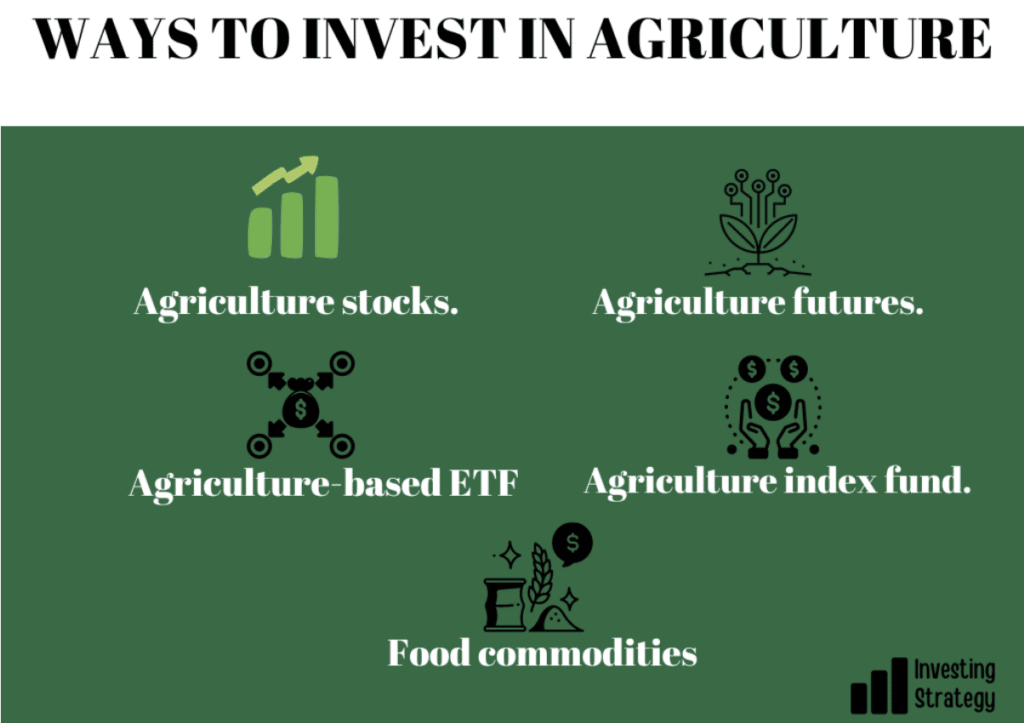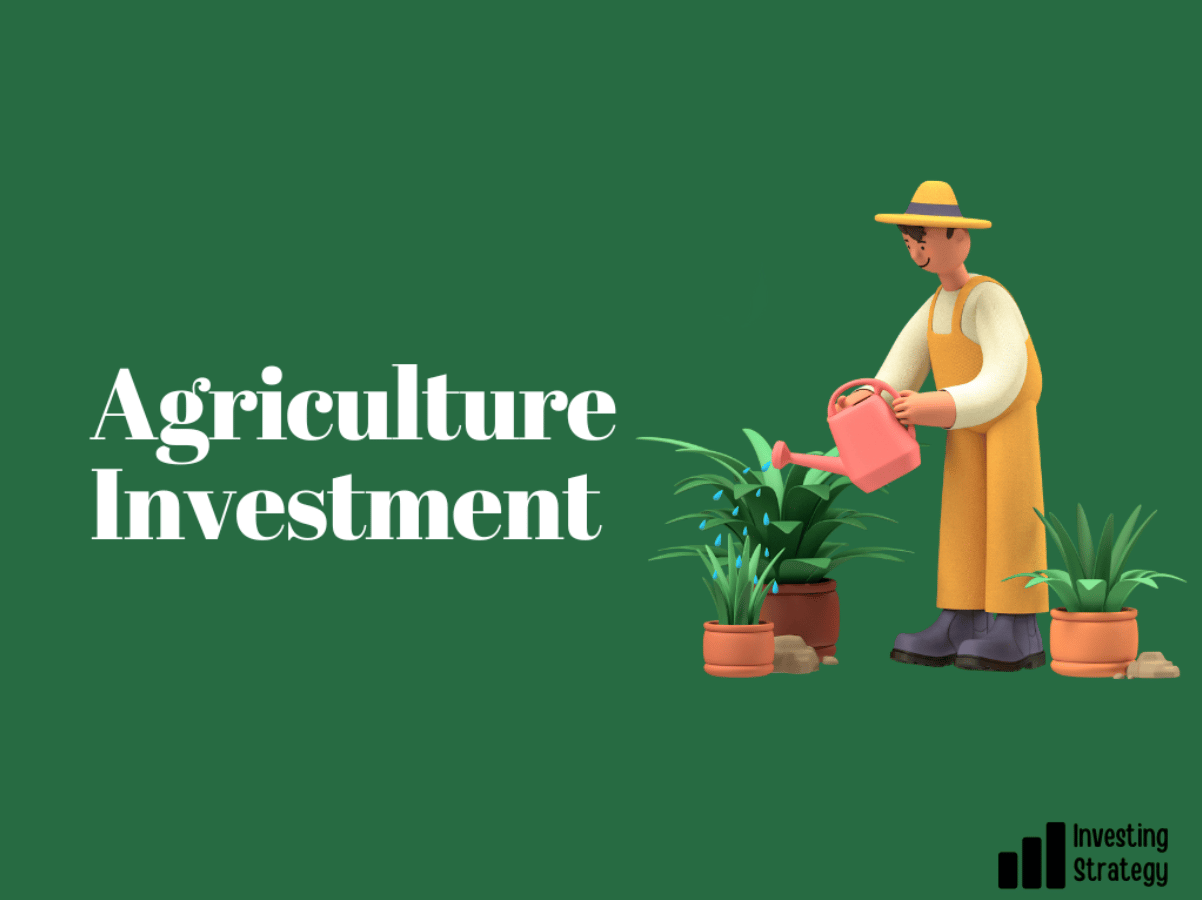Agriculture is a great place to invest your money. The industry is constantly growing, and it’s not susceptible to the same downturns as other industries. If you’re looking for a good way to invest your money, agriculture is an excellent choice.
Concise Overview
- Agriculture investments are securities and other assets that are linked to the agricultural sector
- The demand for agricultural products is increasing. As the global population rises, so does the need for food
- To meet demand, farmers are producing more crops than ever before. This means there are more opportunities for investors
Introduction
When we think about investing, we often think of stocks and bonds. But what if you could invest in a business that helps farmers grow more food?
Investing in agriculture doesn’t just mean buying land. You can also buy shares of a company that grows crops. Or you can buy shares of a company that makes equipment for farms. And if you’re looking for something even more unique, why not invest in an app that helps farmers track their crops?
Even though agriculture has always been an essential part of global life, it has changed as we’ve entered a new phase of human development. As more people move to cities and technology becomes more advanced, agriculture has had to adapt to these changes to survive.
There are several ways you can invest in agriculture. This guide will give you some tips on how best to invest in this growing field so that you can take advantage of all its opportunities.
What is Agriculture Investment?

Agriculture investment is a term that refers to the act of investing money in agricultural projects. It’s also known as agribusiness, and it can refer to many different types of businesses and activities, including farming, ranching, and timber production.
Agriculture investment is an excellent way for investors to diversify their portfolios by adding some potentially high-returning investments into the mix. These investments are generally made to increase productivity, efficiency, and profitability.
Why Now is the Right Time to Invest in Agriculture
The world is getting more volatile. And it’s not just about geopolitical tensions but that we all can’t seem to keep food on the shelves long enough to make it to our tables.
It’s hard not to notice famines in places like Somalia and Ethiopia, where millions of people have been unable to access the food they need to survive. Even in countries where they aren’t starving, hunger-related deaths have occurred due to malnutrition and other illnesses.
But it’s not just countries like Somalia or Ethiopia. In the UK alone, at least 4.7 million adults are food insecure — meaning they don’t have enough money to buy food for themselves or their family members. That number has risen steadily since 2021, from 7.3% to 8.8% in UK households.
So what does all this mean? It means investing in agriculture now is more important than ever, and here are reasons to do so:
Rising Global Food Insecurity
Global food insecurity is a growing problem, and the world is becoming increasingly dependent on the agriculture industry. We’re facing issues like climate change, population growth, and resource competition as we try to feed more people. Still, people are working every day to ensure we can continue to produce enough food to meet demand. The global agriculture industry is growing. An investment in agriculture will help support this industry against food insecurity.
Low Supply, High Demand
Supply and demand are essential. The more you have of something, the less valuable it is. The less you have of something, the more valuable it is. And in agriculture, the demand for food is higher, and fewer people are growing it. Why? More people are moving to urban areas, climate change affects farmers’ ability to grow crops and maintain their land, and more inexpensive food imports have flooded markets. This means there’s a shortage you can leverage by investing in farms and other agricultural businesses.
Low Risks, High Profits
Agricultural investments are less risky than other types of investments because they are less volatile and less dependent on the economy. They have a low correlation with other financial asset classes; they don’t move in tandem with stocks or bonds. And they tend to perform well during economic downturns because they provide products necessary for people across all economic classes. If you’re looking for high profits, agriculture offers those as well. Just ensure you’re making the right investments.
Serves as a Hedge for Inflation
Rising global inflation means this is the time to invest in agriculture. Agriculture is a safe bet for your portfolio because it provides a hedge against inflation. As prices go up, so does the demand for food and other agricultural products — and that means more money for farmers. When inflation is high, it’s not uncommon for investors to flee from stocks in favour of bonds or cash. But when you invest in agricultural commodities, you can earn a higher return than what you’d get from traditional investments. This can help offset some of the impacts of rising prices on your wallet.
More Sustainable Than the Stock Market
One of the most critical factors in determining the right time to invest in an industry is sustainability. When looking at the stock market, you have to consider that your money will be tied up for years — and if you’re investing in a company that’s not doing well, you could lose a lot of money. That’s not the case with agriculture. While there are certainly risks involved (like weather and pests), the industry is growing and expanding, which means your investment can grow with it.
Opportunities to Consider in Agribusiness
Agribusiness is one of the most exciting and fast-paced industries in the world. It’s also one of the most varied and dynamic, with many growth opportunities. Below are some to consider.

Fertilisers
Fertilisers are a great opportunity to consider in agribusiness. Farmers use them to help increase soil fertility and crop yield. There are many different types of fertiliser, but the two most common types are organic and synthetic. Organic fertilisers include compost, manure and plant-based materials like green or brown wastes. Synthetic fertilisers contain chemical compounds that release nutrients into the soil when decomposed. An example is ammonium sulphate.
Pesticides
The pesticide industry is a huge business, and it’s only getting bigger. As populations grow, so does the need for food. And as the world population continues to expand and people move to cities, farmers are more pressured to produce more food with less land. That’s why there’s a growing demand for pesticides: chemicals that kill or inhibit the growth of pests that threaten crops. Farmers use these chemicals to protect their plants from infestation, disease, or other threats.
Digital Agriculture
Digital agriculture uses the internet to connect farmers with consumers and other businesses. It involves using sensors, drones, and other technology to collect data about crops and soil conditions, as well as sharing this information with other farmers. This can help farmers make better decisions about what to plant and improve their output, and lower costs. It can also help them access new markets for their products by allowing them to share information about their goods with consumers.
Plant-Based Meats
Plant-based meats are said to be the future of the meat industry. The meat alternatives market is increasing, and this is due to several factors. Many people are choosing to avoid or reduce their intake of animal products for health reasons. Additionally, there is a growing environmental concern regarding the impact of raising livestock on the environment. Finally, there is a growing interest in plant-based diets as a whole. So it’s a good time to consider investing in this market.
Vertical Farming
Vertical farming is a growing trend in the agribusiness industry. The idea is to grow food indoors instead of on farms or fields. This allows for more control over the crops’ environment, leading to better quality and fewer pesticides. Vertical farming also allows farmers to grow crops year-round, so they have a more extended season than they would if they were planted in fields. It doesn’t need as much land as traditional farming does, and it uses less water and fewer pesticides than traditional farms do because it’s indoors.
Biologicals
Biologicals are products made from living organisms, such as vaccines and blood. They can be used to help animals, plants, and humans. Biologicals are also called biologics or biopharmaceuticals. The use of biologicals in agriculture is gaining popularity as new scientific advances permit the development of more effective products than traditional chemicals. These products include vaccines, hormones and growth regulators (HGRs), antibiotics, and other therapeutic proteins.
What to Know Before Investing in Agriculture
Investing in agriculture is a great way to get involved with the financial world, but it’s also an exciting and challenging option. Before you jump in, there are a few things you should know.
- Identify Trends: You should identify trends in the market. This will help you understand what other people are doing and how they are making their investments. By understanding what everyone else is doing, you can make sure that your investments fit with the market as a whole.
- Understand the Market: You should understand the market itself. The agriculture industry is vast and complex, so you must take the time to learn about all aspects before investing.
- Perform a Self-Analysis: Perform a self-analysis on yourself to see how well-suited you are for investing in agriculture. If there are areas where your skills fall short or if there are gaps in your knowledge base, then those areas need to be addressed before investing any money into an agricultural company or product line.
- Choose What to Invest in: Ask yourself where you want to invest your money. You can invest in a single farm or combine multiple farms into one investment pool. You might also consider investing in an agricultural fund that pools many people’s investments and invests them in various farms.
- Assess Risk Factors: Finally, assess the risk factors involved in investing. Many things could go wrong with an agricultural investment — weather, pests, disease. So, ensure you can handle whatever comes your way by having an exit strategy for getting out of the investment if necessary.
Investing in agriculture can be an enriching experience, but it’s important to know what you’re getting into. You’ll need the right skills and resources to succeed, but the rewards can be worth it.
Ways to Invest in Agriculture
You’ve heard of the stock market, but what about the farm? It’s not just for farmers anymore. There are a lot of ways to invest in agriculture — and we’re going to tell you about some of them.

Buy Agriculture Stocks
Agricultural stocks are typically considered riskier than other investments, but they can also yield higher returns when the market is right. There is also more opportunity for diversification with these types of stocks because there are so many different types of crops and livestock being produced all over the world.
It’s essential to be careful with your investments when looking into agricultural stocks because they’re not all created equal. Some companies produce specific types of food products. In contrast, others focus on livestock or produce farming or even biofuels like ethanol fuel or biodiesel fuel from plants like soybeans or palm oil trees.
Plenty of online resources are available for researching different companies before deciding which ones might be best suited for your portfolio based on what kind of return you want from your investment over time and what type(s).
Invest in Agriculture Futures
The agricultural futures market is a good way for investors to hedge their risk and make money by predicting the price of commodities. It’s also an excellent way for farmers to lock in a price for their products before they sell them.
Futures contracts are used to buy or sell commodities at a price agreed upon today but delivered or paid for at some point in the future. So, if you think that wheat will be more expensive tomorrow, then you can buy a contract today at today’s price and then sell it tomorrow at tomorrow’s price (depending on what happens). If you’re right, then you’ve made money, and if not, then you’ve lost money. You can buy futures through a broker or an online brokerage.
Invest in an Agriculture-Based ETF
The easiest way to invest in agriculture is through an exchange-traded fund (ETF). ETFs are baskets of stocks that track a specific index. They’re a great way to get exposure to an entire market, like the agricultural industry, without buying individual stocks. When you buy an ETF, you own a piece of all the companies in the index it tracks.
If you want to invest in agriculture, look into agricultural ETFs that track indexes like the Dow Jones U.S. Agriculture Index or the Dow Jones Agriscience Index. That way, when you buy into one of these funds, you’re exposed to hundreds of different companies at once — and some (if not all) of their profit potential.
Invest in an Agriculture Index Fund
An agriculture index fund is a type of mutual fund that tracks the performance of various agricultural commodities, companies, and industries. The goal is to give investors exposure to the broader agricultural market without the need to pick individual stocks or trade futures contracts.
There are several advantages to investing in an agriculture index fund over other options. First, they’re simple: you don’t need special skills or training to manage your portfolio. Second, they allow you to diversify your portfolio and not just focus on one industry or sector (like energy or technology). Third, they provide access to investments that might otherwise be difficult for individual investors to access — such as commodities exchanges or commodities futures markets — at low cost and with minimal risk.
Invest in Food Commodities
Food commodities are agricultural products that are grown, harvested, and processed for use as food or feed. Investing in them is a great way to support the agricultural industry.
Besides, food commodities are a great way to invest in agriculture because they are always in demand. You can buy foods at their lowest price and then sell them when they increase in value. This strategy works best if you know what you’re doing, so you must research before investing. Make sure you understand how the market works so that when you buy low, it will be worth more when it’s time for you to sell high.
The Bottom Line
Agriculture is one of the best places to invest. It’s an industry that has been around since the beginning of time, and it will continue to be around for quite some time. It’s a growth industry with many investment opportunities, global benefits, and minimum risks.
There are lots of ways to invest in agriculture. You can buy farmland or invest in companies that produce farm products. You can also invest in agricultural technology or put money into an index fund that tracks the stock market. Investing in agriculture is a great way to get involved in an industry that is constantly changing and growing.

